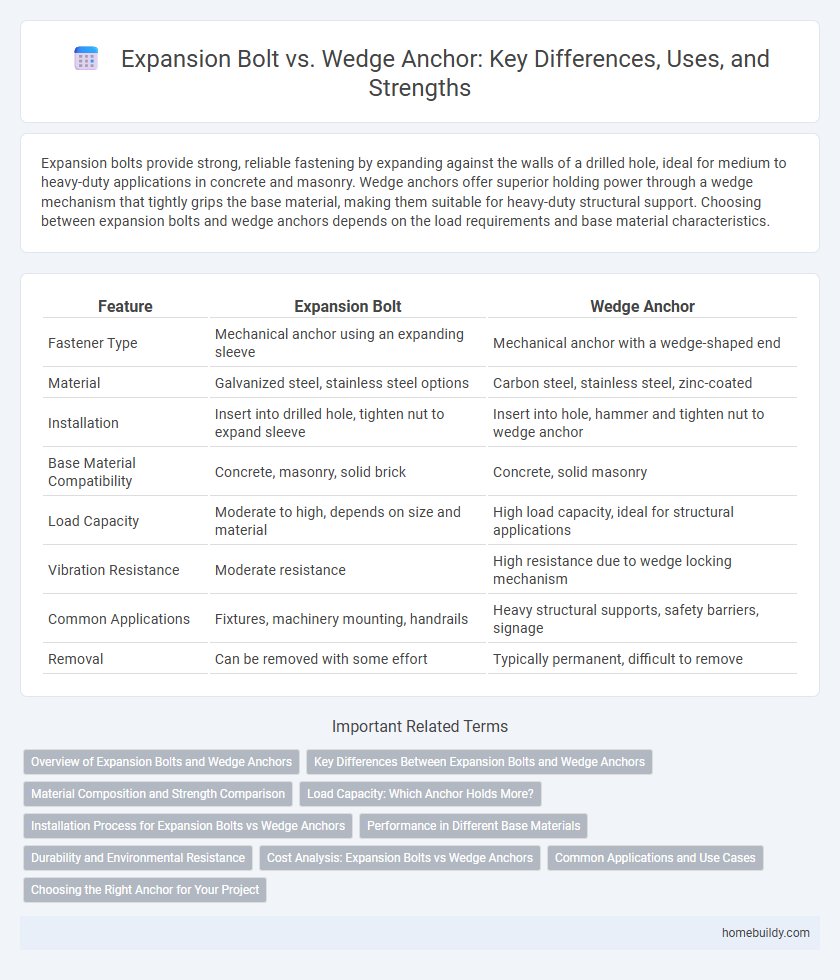Expansion bolts provide strong, reliable fastening by expanding against the walls of a drilled hole, ideal for medium to heavy-duty applications in concrete and masonry. Wedge anchors offer superior holding power through a wedge mechanism that tightly grips the base material, making them suitable for heavy-duty structural support. Choosing between expansion bolts and wedge anchors depends on the load requirements and base material characteristics.
Table of Comparison
| Feature | Expansion Bolt | Wedge Anchor |
|---|---|---|
| Fastener Type | Mechanical anchor using an expanding sleeve | Mechanical anchor with a wedge-shaped end |
| Material | Galvanized steel, stainless steel options | Carbon steel, stainless steel, zinc-coated |
| Installation | Insert into drilled hole, tighten nut to expand sleeve | Insert into hole, hammer and tighten nut to wedge anchor |
| Base Material Compatibility | Concrete, masonry, solid brick | Concrete, solid masonry |
| Load Capacity | Moderate to high, depends on size and material | High load capacity, ideal for structural applications |
| Vibration Resistance | Moderate resistance | High resistance due to wedge locking mechanism |
| Common Applications | Fixtures, machinery mounting, handrails | Heavy structural supports, safety barriers, signage |
| Removal | Can be removed with some effort | Typically permanent, difficult to remove |
Overview of Expansion Bolts and Wedge Anchors
Expansion bolts are heavy-duty fasteners designed to provide secure anchoring in concrete, brick, and block materials by expanding against the walls of the drilled hole as the bolt is tightened. Wedge anchors, a specific type of expansion bolt, feature a tapered wedge at the base that expands and locks firmly when the bolt is driven into pre-drilled concrete, offering high load-bearing capacity and vibration resistance. Both fasteners are essential in construction and structural applications requiring reliable, strong support for heavy loads.
Key Differences Between Expansion Bolts and Wedge Anchors
Expansion bolts and wedge anchors are both heavy-duty fasteners designed for securing objects to concrete and masonry. Expansion bolts rely on a sleeve that expands outward when tightened, creating a strong grip, whereas wedge anchors use a tapered, wedge-shaped end that locks into place as the bolt is driven in. The main difference lies in their installation method and expansion mechanism, with wedge anchors offering higher load capacities and better performance in solid concrete applications compared to expansion bolts.
Material Composition and Strength Comparison
Expansion bolts are typically made from carbon steel or stainless steel, offering high tensile strength and corrosion resistance ideal for medium-duty applications. Wedge anchors, often manufactured from hardened steel or stainless steel, provide superior shear and tensile strength suited for heavy-duty anchoring in concrete. The material composition of wedge anchors generally ensures greater load-bearing capacity and durability compared to expansion bolts, making them preferable for structural and high-stress environments.
Load Capacity: Which Anchor Holds More?
Expansion bolts generally offer higher load capacity compared to wedge anchors due to their design that expands evenly within the drilled hole, creating a strong grip. Wedge anchors provide reliable holding power but typically have lower load ratings, making them better suited for lighter applications. Engineers often choose expansion bolts for heavy-duty structural installations requiring maximum holding strength.
Installation Process for Expansion Bolts vs Wedge Anchors
Expansion bolts require drilling a hole slightly deeper than the bolt length, then inserting the bolt and tightening the nut to expand the sleeve against the hole walls for secure fastening. Wedge anchors involve drilling a hole matching the anchor diameter, inserting the anchor, and tightening the nut, causing the wedge-shaped end to expand and grip firmly within the concrete. Both fasteners need precise hole depth and diameter for optimal performance, but expansion bolts rely on sleeve expansion while wedge anchors use a wedge mechanism for anchoring strength.
Performance in Different Base Materials
Expansion bolts offer superior performance in solid concrete and dense masonry due to their reliable expansion mechanism that grips tightly under load. Wedge anchors excel in cracked or uncracked concrete by providing strong, vibration-resistant holding power through their wedge-shaped locking system. Both fasteners ensure secure anchoring, but wedge anchors typically perform better in dynamic or high-stress environments.
Durability and Environmental Resistance
Expansion bolts and wedge anchors both offer high durability, but wedge anchors typically exhibit superior environmental resistance due to their robust galvanized or stainless steel construction. Expansion bolts perform well in dry indoor conditions but may corrode faster in harsh outdoor environments without proper coatings. Wedge anchors maintain structural integrity under extreme weather and corrosive conditions, making them ideal for heavy-duty, long-term fastening applications in industrial and marine settings.
Cost Analysis: Expansion Bolts vs Wedge Anchors
Expansion bolts generally offer a lower initial cost compared to wedge anchors, making them a cost-effective solution for lighter applications. Wedge anchors provide superior holding strength and durability, which can reduce long-term maintenance and replacement expenses in heavy-duty projects. Evaluating total lifecycle costs, including installation labor and material performance, is essential for choosing between expansion bolts and wedge anchors.
Common Applications and Use Cases
Expansion bolts are frequently used in heavy-duty applications such as securing structural steel, machinery, and large equipment to concrete or masonry. Wedge anchors are commonly preferred for medium to heavy loads in concrete, often used in fastening handrails, signs, and support brackets in construction projects. Both fasteners provide high load-bearing capacity, but wedge anchors are favored in environments requiring quick installation and high resistance to vibration.
Choosing the Right Anchor for Your Project
Expansion bolts provide reliable heavy-duty fastening by expanding against base material, ideal for concrete and masonry applications requiring high load capacity. Wedge anchors deliver superior holding power through a mechanical wedge mechanism that secures tightly within drilled holes, ensuring stability under vibration and dynamic loads. Selecting the optimal anchor depends on substrate type, load requirements, and environmental conditions to maximize structural safety and durability.
Expansion Bolt vs Wedge Anchor Infographic

 homebuildy.com
homebuildy.com